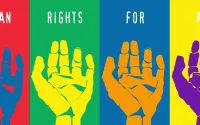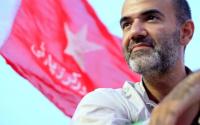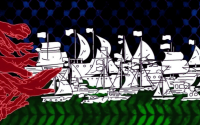by Elizabeth WrigleyThe antiwar movement is back. The quarter-million marching past the White House on September 24 heralded its reemergence, and none too soon. For those of us on campuses, it was particularly gratifying to see evidence of the national student movement that is beginning to cohere -- with "College Not Combat, Relief Not War" contingents organized by the Campus Antiwar Network bringing together 2,000 students at the DC march and hundreds in San Francisco.
This student movement is significant, because it is students who are targeted daily by military recruiters asking us to leave school and become the next round of cannon fodder in a war most of us oppose. And it is the rising opposition to war among young people, and the grassroots counter-recruitment movement that began to take shape on campuses last spring, that has put the Army in its worst recruiting slump since 1979.
And yet events of the last week make it clear that students' right to dissent from the war, and from the recruitment taking place on our campuses, remains in question. At three different colleges in the last week -- Holyoke Community College, George Mason University, and UW-Madison -- students engaging in peaceful counter-recruitment were met with police repression. At Holyoke and George Mason, students face ongoing charges from the school or the state. The ability of the student movement to grow, and to continue to challenge our schools' role in recruiting for the war, will depend on our defending our own right to dissent.
Holyoke Community College
On Thursday, September 29, 30 Holyoke Community College (HCC) students engaged in a peaceful picket of the Army National Guard recruiting table in the school's cafeteria, organized by the HCC Anti-War Coalition, a chapter of the Campus Antiwar Network.
The police assault began after Peter Mascaro, the head of campus security, snatched a homemade sign reading "Cops are hypocrites" from a student's hands, calling it "inappropriate." Officer Scott Landry then grabbed the student and, joined by three other officers, lifted him off the ground and assaulted him. When other students came to his defense, Landry then grabbed another student, Charles Peterson -- who witnesses describe as playing a moderating role throughout the protest -- put him in a headlock, and sprayed mace in his face. Around 20 state police armed in riot gear and gas masks then arrived in the cafeteria. When one student tried to leave, he found 10 to 15 police officers pointing their guns at him. Only with difficulty were the protesters able to peaceably disperse. (Pictures of this protest are available at http://www.campusantiwar.net)
The next day, Charles Peterson was visited at home by two members of the state police, who informed him that he is indefinitely banned from campus, and will be arrested for trespassing if he sets foot on HCC. In violation of the school's own rules, Charles has been denied any due process, and has not even been given the ability to speak to administrators about the charges against him. Since Charles -- in addition to being a model student at HCC, holding the James Taylor Award for Excellence in Philosophy and serving as the Vice President for Academic Affairs on the Student Senate -- is also employed at the school, this creates a financial hardship for him as well.
The assault on student protesters and the administration's banning of Charles Peterson occurs in the context of an organized and confident right wing on the extremely polarized HCC campus. Officer Scott Landry, who led the assault on the students, is also the advisor to the College Republicans. While the assault was taking place, those College Republicans lined up behind the police to cheer on the attack. Last year, the same group led a campaign of harassment and sexist intimidation against then-president of the HCC Student Senate, Angela Greany, after she passed a resolution opposing military recruitment on campus. In the climate created by this group, many students who had participated in Thursday's protest decided not to attend their classes on Friday for fear of harassment from right-wing students.
George Mason University
On the same day as the assault on HCC's protesters -- Thursday, September 29 -- Tariq Khan was assaulted and arrested by police at his school, George Mason University (GMU) in Virginia. Tariq, a Pakistani-American who himself served in the U.S. Air Force, stood near a Marine recruiting table at his school wearing signs that said "Recruiters tell lies. Don't be fooled" and "U.S. out of Iraq, Israel out of Palestine, U.S. out of North America."
Three right-wing students quickly surrounded Tariq, yelling at him and ripping one of the signs from his shirt. One of them, who claimed to be a veteran of the Iraq war, said he could not wait to return and kill more Iraqis. School administrators then arrived to question Tariq, followed by officer T.L. Reynolds, who threw Tariq on the ground and put him in a choke-hold.
According to GMU student David Curtis, who witnessed the entire sequence of events, as Tariq's eyes were watering and his face turning red, he struggled to keep saying that he was not being violent and was being attacked for no reason. Officer Reynolds picked him up from behind, slammed him into a stage (cutting his face), and threw him back on the ground, choking him once again. Two students (including one who had been harassing Tariq) and a non-security campus employee then assisted Reynolds in violently handcuffing Tariq. Police dragged him to a police car and threatened him with pepper spray. Throughout this experience, Tariq Khan repeatedly stated his own non-violence and innocence. (David Curtis's detailed account is available at http://www.campusantiwar.net/)
Despite requests for medical treatment and a lawyer, Tariq received neither, and was taken to the Fairfax Adult Detention Center, where he was charged with trespassing (on his own campus), resisting arrest, and disorderly conduct. His treatment throughout echoes the racism of the U.S. treatment of Arab prisoners in Guantanamo Bay and Iraq. As Tariq relayed to me, Officer Reynolds justified handcuffing Tariq by telling him, "I didn't know who you were, and what with 9/11 and everything, there's no telling what you would do." Another officer chimed in, "You people are the most violent people in the world. You're passive aggressive!" Officer Reynolds then warned Tariq to keep his mouth shut and avoid looking at anyone, because if he so much as looked at an officer wrong, they would "hang you from the ceiling by your feet."
We will not be intimidated
The day before the assaults at HCC and GMU, 25 students at the University of Wisconsin at Madison were threatened with arrest if they continued to peacefully protest military and CIA recruiters at their school's career fair -- even though no police officer or administrator was able to show them a campus rule they were violating. It is clear that HCC and GMU are not anomalies. Campus administrators and right-wing forces on campus watched the counter-recruitment movement take off last spring, and they are determined not to allow their schools to become the sites of the new movement against military recruiters.
But no amount of repression can disguise a fundamental shift that has taken place in U.S. politics over the past few months. Cindy Sheehan's stand in Crawford ignited a sense among the antiwar majority that something can be done -- and the callousness of the government's response to Hurricane Katrina helped show why it must be. As hundreds of thousands marched in DC, a Rasmussen Reports survey found that 23% of Americans consider themselves part of the antiwar movement. For the first time in years, it is supporters of the war, not its opponents, who are on the defensive.
Our movement needs to defend students whose academic status, financial security, and physical safety are threatened by campus administrators and police. The HCC and GMU administrations were banking that no one would care what they did to their students. The over 700 phone calls of complaint HCC has already received -- and the statements of support that have poured in, from people ranging from Cindy Sheehan to other students who have faced similar repression -- show how wrong they were. This is the time to stand up for our freedom of dissent -- because we're right to oppose the war, right to oppose recruitment in our schools, and now, most people know it.
Call the HCC, GMU and UW-Madison administrations and let them know what you think:HCC President William Messner: (413) 552-2222HCC Campus Police Officer/College Republicans Advisor Scott Landry: (413) 552-2048GMU President Alan Merton: (703) 993-8700UW-Madison Chancellor John Wiley: (608) 262-9946
For more information or updates on the defense campaigns at all three schools, see http://www.campusantiwar.net/
Elizabeth Wrigley-Field is a student at NYU and a member of the Campus Antiwar Network who writes frequently on counter-recruitment. Email her at [email protected]






